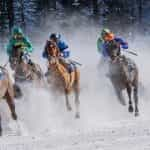BOS Backs Refusal of Horse Racing Levy
The Swedish online gambling association, Branschföreningen för Onlinespel (BOS), has reacted to a consultation carried out by Sweden’s Ministry of Finance concerning the financing of the horse racing industry. The consultation found that there was no reason for the state to present any new financing model for the horse racing industry.

The Swedish online gambling association, Branschföreningen för Onlinespel (BOS), has reacted to a consultation carried out by the Ministry of Finance on the financing of the horse racing industry. The consultation found there were no grounds to financing horse racing differently. ©Orfeys65/Pixabay
BOS in Agreement with Consultation’s Conclusion
Following a consultation led by Sweden’s Ministry of Finance dealing with the financing of the horse racing industry in the country’s re-regulated gambling market, Swedish online gambling association Branschföreningen för Onlinespel (BOS) has come out in agreement with the ministry’s conclusion.
The conclusion reached following the Ministry of Finance’s consultation found that there was no justifiable reason for the state to create any new financing model for the horse racing industry.
The major change in question here was the potential introduction of a mandatory levy fee attached to betting on horse racing.
What this would look like in practice, for example, is a 5% levy of all gross sales, done in order to distribute any funds generated by the horse racing industry.
In addition to the Swedish Ministry of Finance’s rejection of the horse racing levy, the country’s Gambling Market Inquiry also came out and rejected the proposal in its entirety.
Swedish online gambling association Branschföreningen för Onlinespel (BOS) was, naturally, also in support of the Gambling Market Inquiry’s decision.
Association Supports Conclusion Based on Principle and Practical Reasons
Following the Swedish Ministry of Finance consultation which resulted in the rejection of the proposed levy on horse racing betting, Swedish online gambling association Branschföreningen för Onlinespel (BOS) presented its own statements in support of the ministry’s conclusion.
Secretary general of Branschföreningen för Onlinespel (BOS) Gustaf Hoffstedt explained that the association agreed with the Ministry of Finance’s conclusion based on both principles and practical reasons.
“On principle, you cannot own, and consequently charge for, information that is open to everyone. This includes results that are often used in various types of betting,” explained Hoffstedt.
Hoffstedt criticized in particular the size of the proposed levy on horse racing betting:
“A practical reason is that the proposed market fee would be as large as the entire gross gaming revenue. Everything that remains after the winnings have been paid out to the winners would have to go to cover the levy fee. Few gaming companies would be interested to operate under such conditions.”– Gustaf Hoffstedt, Secretary General, Branschföreningen för Onlinespel (BOS)
The Branschföreningen för Onlinespel (BOS) raised further issues concerning the channelization of the regulated Swedish gambling market.
The association insisted that if such a levy of 5% on all gross sales generated by horse racing betting were to be introduced, unlicensed and offshore operators would enjoy a competitive advantage over Swedish-based regulated operators and entities.
Finally, the BOS provided another criticism of the proposed levy on horse racing by claiming that a mandatory market fee would also mean a deduction before taxation, which would therefore lead to reduced tax revenues.
The association described the reduction of a tax revenue “that is so widely accepted and functional” as an “unthinkable” measure.
Tighter Regulations Proposed for iGaming in Sweden
Debates concerning the proposed levy on horse racing betting in Sweden’s gambling market have been ongoing since at least December 2020 — when the Swedish Gambling Market Commission, known locally as the Spelmarknadsutredningen, presented its much anticipated report on the regulation of igaming in the country.
Fears among Swedish gambling operators that a levy would be applied to horse racing betting were dispelled after Anna-Lena Sörenson, head of the Swedish Gambling Market Enquiry, assured the industry that such fees would not be applied to the vertical.
Despite the dismissal of the horse racing levy in the Swedish Gambling Market Commission’s report, more stringent controls on the Swedish gambling market were nevertheless proposed.
One of these proposals came in the form of a blanket ban on all iGaming advertising in Sweden, after lawmakers identified what they considered to be overly aggressive marketing practices by licensed operators.
Yet the remaining proposals as part of the Swedish Gaming Market Commission’s investigation into the country’s gambling market largely focused on unlicensed gambling activity.
The report recommended additional measures to combat unlicensed gambling activity, such as offering a licensing system for software providers to use, as well as increasing controls to prevent offshore businesses from operating in Sweden.
Such controls could take the form of, for example, strictly prohibiting the promotion of all unlicensed gambling, as well as widening the ban on broadcast advertising for illegal gambling to cover foreign stations and online video sharing networks.
The SEK5,000 deposit cap currently imposed on casino games could also be made permanent as part of the report’s recommendations, which would then be reviewed by Sweden’s main gambling regulator Spelinspektionen once it has been in effect for several years.
No Real Rise in Problem Gambling in Sweden, Despite Covid-19
In related news, as the global coronavirus (Covid-19) pandemic rages on, state owned and run operator Svenska Spel reported in October 2020 that it has not seen a significant increase in problem gambling in Sweden as a result of Covid-19 restrictions.
There has been much discussion in both Sweden and across Europe concerning the impact that the pandemic could have on gambling behavior, as people find themselves with more and more free time and less stable sources of income.
Nevertheless, at the peak of the restrictions that were implemented during the pandemic, studies presented to the Independent Research Council of Svenska Spel found that the average spend for Swedish gamblers fell.
With the widespread cancelation of sporting events due to the ongoing coronavirus (Covid-19) pandemic, it is perhaps unsurprising that the average spend of gamblers fell, seeing as there were simply fewer options available to gamble.
It is worth noting, however, that professors from Lund University found that players that were known to have issues with gambling before the pandemic did tend to spend more than others.



